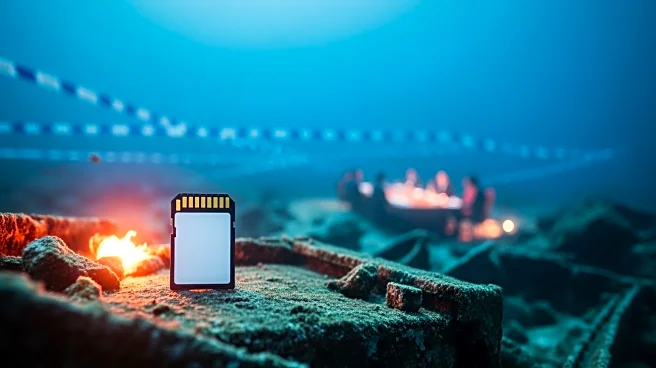What's Happening?
Recovery teams investigating the wreckage of the Titan submersible, which imploded in June 2023 during a dive to the Titanic shipwreck, have discovered an intact underwater camera containing a perfectly unharmed SD card. The submersible, operated by OceanGate,
tragically killed all five passengers on board, leading to extensive investigations. The camera, identified as a SubC Rayfin Mk2 Benthic, was found with a shattered lens but an intact casing. Despite the memory card being undamaged, the data on it appeared encrypted or otherwise inaccessible. Investigators, working with the Canadian Transportation Safety Board and camera manufacturer SubC, managed to recover nine videos and 12 images, none of which were from the accident dive. Most images were taken above sea level at the Marine Institute main campus.
Why It's Important?
The discovery of the intact SD card amidst the wreckage is significant as it highlights the durability of certain technological components even in catastrophic conditions. While the recovered data does not provide insights into the accident itself, it underscores the importance of robust safety practices and equipment reliability in deep-sea explorations. The incident has prompted scrutiny over OceanGate's safety protocols, with US officials labeling the tragedy as preventable due to critically flawed safety practices. This revelation may influence future regulatory measures and safety standards in the industry, potentially affecting companies involved in underwater expeditions and technology manufacturing.
What's Next?
The investigation into the Titan submersible incident continues, with potential implications for OceanGate and similar expedition companies. Regulatory bodies may push for stricter safety standards and oversight to prevent similar tragedies. The findings could lead to advancements in underwater camera technology, focusing on data encryption and accessibility in extreme conditions. Stakeholders, including government agencies and industry leaders, are likely to engage in discussions on improving safety measures and technological resilience in deep-sea exploration.
Beyond the Headlines
The discovery raises questions about the ethical responsibilities of companies involved in high-risk expeditions. It highlights the need for transparency and accountability in safety practices, potentially leading to legal and cultural shifts in how such operations are conducted. The incident may also influence public perception of deep-sea exploration, affecting future investment and interest in the field.















